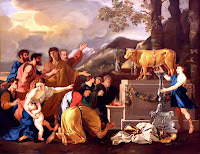 Danny Boyle explained his Olympics vision to the BBC's Huw Edwards, saying the ceremony 'has to represent us and feel truthful.' As Martin Luther found to his surprise, there is no single 'truth', rather, as many interpretations thereof as there are people.
Danny Boyle explained his Olympics vision to the BBC's Huw Edwards, saying the ceremony 'has to represent us and feel truthful.' As Martin Luther found to his surprise, there is no single 'truth', rather, as many interpretations thereof as there are people.
So what particular 'truth' was Boyle trying to convey? At a first glance, it's English history (the rural idyll was particularly English, the industrial scenes more common to all our nations). At second glance, there's a troubling undercurrent to Boyle's ideas.
 It looked like the Lord of the Rings films. That is not a cheap point. The rural idyll looked like the Hobbits' shire, the industrial hell much like the hell of Mordor. Boyle has borrowed from Tolkein's vision of urban industrialisation.
It looked like the Lord of the Rings films. That is not a cheap point. The rural idyll looked like the Hobbits' shire, the industrial hell much like the hell of Mordor. Boyle has borrowed from Tolkein's vision of urban industrialisation.
But how are we to respond to it at the Olympics? In so far as this shire, this 'merry olde England' was ever true (which it wasn't - peasant life was bondage, hardship and toil, not simple pleasures and honest living) it is gone now. All of that's hard for me, as an English patriot, to admit. And I'll admit something else to you, that the evocation of a lost England to the sound of Jerusalem made me want to cry. And to the extent that any of it yet remains, only a small fraction of us live that way: we are a city nation now. Enter: The Dark Satanic Mills.
 The people literally tore up the land, revealing urban sprawl, heaving and dense conurbations with industrial blights rising all around them, the lights going down, the land turning dark, the brutalised peasants now brutalised workers, toiling at the furnaces. This hurt to watch. This really hurt. Despite anachronisms, this was a truth indeed.
The people literally tore up the land, revealing urban sprawl, heaving and dense conurbations with industrial blights rising all around them, the lights going down, the land turning dark, the brutalised peasants now brutalised workers, toiling at the furnaces. This hurt to watch. This really hurt. Despite anachronisms, this was a truth indeed.
But then, the twist. Toiling under the yoke of capitalism, what exactly did the workers forge? The Olympic rings.
There's a narrative for you. The land destroyed, the people enslaved, all to build the Olympic dream. What a way to start the games, what a comment on our times. It's asking us to ask the question: is this worth the heavy price we pay?
Is this a Golden Calf? An idolatrous reification of something ineffable, the workers' fruit no use to them - nothing to build a home or feed a family - but put to the furnace for someone else's false god, to be looked on in awe and wonder; they, to be forgotten.
Boyle wanted 'truth'. This is more subversive critique, far more profound than the whingeing about the price tag one hears daily rehearsed in the media. It was quiet enough that we could still gape at our Golden Calf, loud enough to trouble us. Some have criticised it for being 'lefty'. It isn't, it's iconoclastic.




